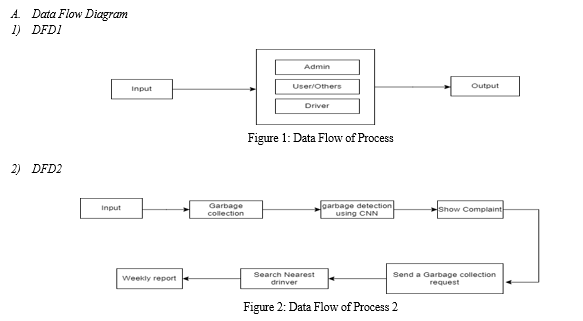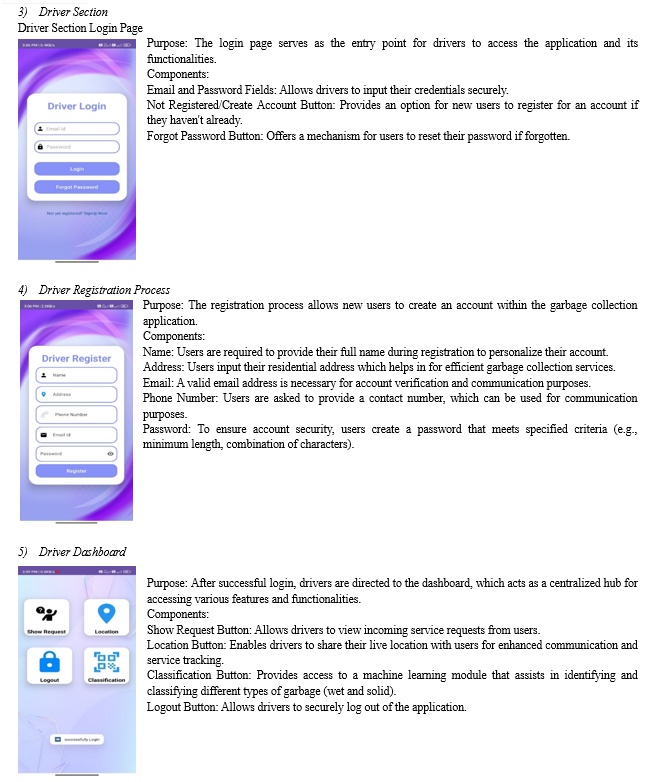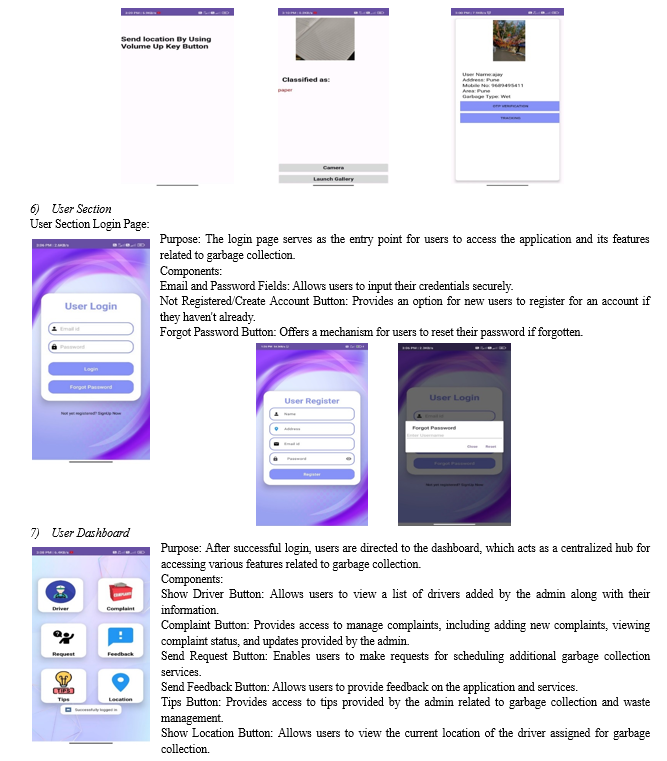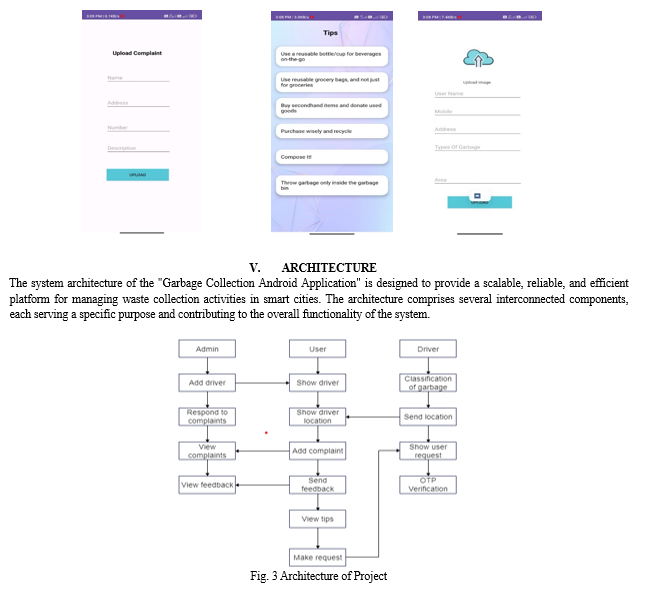Ijraset Journal For Research in Applied Science and Engineering Technology
- Home / Ijraset
- On This Page
- Abstract
- Introduction
- Conclusion
- References
- Copyright
Garbage Collection Android Application
Authors: Prof. Farheen Shaikh, Shubham Mangalure, Ganesh Misal, Sanket Shelke, Shrihari Waykule
DOI Link: https://doi.org/10.22214/ijraset.2024.59995
Certificate: View Certificate
Abstract
The \"Android Garbage Collection Application\" stands as an innovative solution tailored for Android devices, with the objective of revolutionizing waste management in smart cities. Conventional waste collection methods frequently result in missed pickups, litter accumulation, and potential public health risks. This project harnesses seamless integration with Firebase to create a user-friendly Android app. It provides real-time notifications to residents as garbage collection trucks approach their locations. A central feature of this app is its live tracking system, enabling users to monitor the precise location of the garbage truck in real-time. Additionally, it offers estimated arrival times, effectively reducing waiting times for residents and optimizing the waste collection process. What truly sets this application apart is its focus on community engagement. By actively involving residents in the waste management process, it encourages shared responsibility and cooperation among city dwellers, fostering a cleaner environment and ensuring timely and efficient waste collection. Furthermore, this project serves as a testament to the transformative power of modern technology in enhancing traditional municipal services. It exemplifies how integrating cutting-edge technology can effectively address longstanding challenges and enhance the quality of life for residents in smart cities. The scalability and adaptability of this application make it a valuable asset for optimizing waste management in various urban settings. Its data analytics capabilities provide city officials with valuable insights, enabling more informed decision-making and a proactive approach to waste management.
Introduction
I. INTRODUCTION
In the realm of modern urban development, smart cities are on the rise, presenting innovative solutions to age-old urban challenges. One of these critical challenges is waste management. Conventional waste collection methods have often proven to be inefficient, resulting in missed pickups, unsightly litter, and significant public health concerns. The "Garbage Collection Android Application" discussed in this paper is a pioneering effort to address these issues by leveraging the power of mobile technology. The Android application has been meticulously designed to revolutionize waste management in smart cities, providing a user-friendly and efficient solution. Traditional waste collection processes are transformed through the incorporation of geofencing technology and seamless integration with Firebase.
This dynamic application offers real-time notifications to residents, informing them of the approaching garbage collection trucks. The real-time tracking of these trucks, along with estimated arrival times, minimizes waiting times for residents and ensures the timely disposal of waste. Community participation is a key aspect of this application. By involving residents in the waste management process, it not only enhances user engagement but also optimizes the waste collection process. The "Garbage Collection Android Application" serves as a testament to the potential of modern technology to enhance traditional municipal services. The project's scalability, adaptability, and robust data analytics capabilities make it a valuable tool for optimizing waste management in the context of smart cities. This paper delves into the details of the application, shedding light on its architecture, functionality, and the benefits it brings to urban environments.
II. EXISTING SYSTEM
To address the shortcomings of traditional waste collection systems in municipalities, there is a growing interest in implementing smart waste management solutions leveraging technology and data-driven approaches. This paradigm shift aims to enhance communication with residents, optimize collection routes, and ensure timely waste pickups.
Singapore's implementation of smart waste bins equipped with fill-level sensors [1] exemplifies a data-driven approach to waste management. These sensors provide real-time data on bin capacity, enabling waste management teams to optimize collection routes and minimize unnecessary trips. Such technology not only improves efficiency but also reduces operational costs and environmental impact associated with waste collection.
Barcelona's smart city project [2] further demonstrates the potential of mobile applications and sensor technology in waste management. By leveraging these tools, cities can enhance communication with residents, providing real-time updates on waste collection schedules and facilitating feedback mechanisms. This engagement fosters a sense of community involvement and encourages responsible waste disposal practices. Research efforts, such as the design of smart waste collection systems for smart cities [3], underscore the importance of integrating technology into municipal waste management infrastructure. By leveraging data analytics and IoT devices, cities can optimize resource allocation, reduce operational inefficiencies, and mitigate environmental hazards associated with waste accumulation. Additionally, studies exploring the impact of smart cities on e-waste management [4] highlight the broader implications of urban technological advancements. As cities evolve into interconnected ecosystems, the need for sustainable waste management practices becomes increasingly paramount. By leveraging technology and interdisciplinary approaches, municipalities can mitigate the negative consequences of urbanization on waste generation and disposal.
II. PROPOSED WORK
The Proposed work aims to build upon existing research and initiatives in smart waste management by developing the "Android Garbage Collection Application." This application will address the shortcomings of traditional waste collection systems by providing real-time communication, optimized collection routes, and enhanced resident engagement. The key features and components of the proposed work include:
- Application Development: Designing and implementing a user-friendly Android application tailored for efficient waste management on Android devices. Utilizing Firebase for seamless integration, providing real-time data updates, and ensuring scalability and robustness of the application.
- Real-Time Notification System: Implementing a real-time notification system to alert residents as garbage collection trucks approach their locations. Providing residents with estimated arrival times to optimize waste disposal planning and minimize waiting times.
- Live Tracking Feature: Developing a live tracking system to enable users to monitor the precise location of garbage trucks in real-time. Enhancing user experience by offering visibility into the current status of waste collection activities.
- Scalability and Adaptability: Designing the application architecture with scalability in mind to accommodate the needs of growing urban populations. Ensuring adaptability to diverse urban settings and waste management infrastructures to maximize the application's impact.
- Evaluation and Validation: Conducting thorough testing and validation to ensure the functionality, usability, and reliability of the application. Soliciting feedback from users and stakeholders to identify areas for improvement and refinement.





VI. FUTURE WORK
While the current implementation of the garbage collection Android application has provided valuable insights into enhancing waste management processes, there are several avenues for future work and improvements that could further optimize the efficiency and effectiveness of the system. Some potential areas for future work include:
A. Integration of Advanced Technologies
- Exploring the integration of emerging technologies such as Internet of Things (IoT) devices and sensors for real-time monitoring of waste bins' fill levels.
- Investigating the use of artificial intelligence (AI) and machine learning algorithms for predictive analytics to optimize garbage collection routes and schedules based on historical data and current demand.
B. Smart Routing and Optimization
- Developing intelligent routing algorithms that take into account factors such as traffic conditions, geographical constraints, and collection priorities to optimize garbage collection routes in real-time.
- Implementing dynamic scheduling mechanisms that adapt to changing demand patterns and environmental factors, thereby minimizing resource wastage and maximizing efficiency.
C. Data Analytics and Performance Metrics
- Enhancing the data analytics capabilities of the application to generate actionable insights and performance metrics for stakeholders, including administrators, drivers, and users.
- Implementing comprehensive reporting functionalities to track key performance indicators (KPIs) such as collection efficiency, complaint resolution rates, and user satisfaction levels.
D. Scalability and Deployment Considerations
- Investigating strategies for scaling the application to accommodate larger user bases and expanded service areas.
- Exploring deployment options such as cloud-based infrastructure and containerization technologies to ensure scalability, reliability, and maintainability of the system.
E. Security and Privacy Enhancements
- Conducting thorough security assessments and implementing robust encryption mechanisms to safeguard sensitive user data and prevent unauthorized access.
- Incorporating privacy-preserving techniques to anonymize and protect user identities while still maintaining the functionality and effectiveness of the application.
VII. ACKNOWLEDGMENTS
The authors would like to express their gratitude to the faculty at Sinhgad Academy of Engineering for their guidance and support throughout the development of this application. They would also like to thank the residents who participated in the pilot program and provided valuable feedback for system improvement.
Conclusion
The development and implementation of an intelligent garbage collection Android application for smart cities represent a significant leap forward in addressing the challenges and inefficiencies plaguing traditional waste management systems. This project, fueled by the convergence of cutting-edge technology and the urgent need for improved urban waste management, introduces a cost-effective, user-friendly, and highly efficient solution. The intelligent garbage collection Android application for smart cities stands as a pivotal tool in the transformation of waste management. It not only enriches the lives of residents by providing real-time information and convenience but also contributes to the creation of cleaner, more sustainable, and healthier urban environments. By harnessing the latest technological advancements, this project serves as a blueprint for the future of waste management in rapidly expanding urban areas, where efficiency, user engagement, and environmental responsibility take precedence. This application marks a significant stride toward the development of smarter, more interconnected, and cleaner cities.
References
[1] Prof. Farheen Shaikh, Shubham Mangalure, Ganesh Misal, Sanket Shelke and Shrihari Waykule, “Garbage Collection Android Application,” International Journal for Research in Applied Science and Engineering Technology (IJRASET), Oct 2023. [2] Sonali Bhattacharya, Dipasha Sharma and Pooja Sharma, “Swachh Bharat Mission: an integrative approach to attain public health” in India International Journal of Environment and Health January 2018 [3] Bin Guo et al., \"Design of a Smart Waste Collection System for Smart Cities,\" IEEE Transactions on Industrial Informatics, 2011. [4] Dave Hecker and Derek May, \"Smart Cities and Their Impact on the Future of E-Waste,\" IEEE International Symposium on Sustainable Systems and Technology (ISSST), 2017. [5] Sandra Bruegger and Mohammed Mubarak, \"A Smart City Approach for Improved Waste Collection and Waste Management in European Cities,\" Proceedings of the 2017 Smart City 360° Conference. [6] Sandeep Nair and Anuradha Daptardar, \"Smart Garbage Monitoring and Segregation System for Efficient Recyclable Waste Collection,\" International Conference on Data Science and Management of Data (ICDSMD), 2019. [7] Isra\'a Alqasem and Seifedine Kadry, \"Smart Solid Waste Management System for Smart Cities,\" IEEE/ACS 15th International Conference on Computer Systems and Applications (AICCSA), 2018 [8] Guo, B., et al. “Design of a Smart Waste Collection System for Smart Cities”. IEEE Transactions on Industrial Informatics, 2011. [9] Hecker, D., & May, D. “Smart Cities and Their Impact on the Future of E-Waste”. IEEE International Symposium on Sustainable Systems and Technology (ISSST), 2017. [10] Bruegger, S., & Mubarak, M. “A Smart City Approach for Improved Waste Collection and Waste Management in European Cities”. Proceedings of the 2017 Smart City 360° Conference. [11] Nair, S., & Daptardar, A. “Smart Garbage Monitoring and Segregation System for Efficient Recyclable Waste Collection”. International Conference on Data Science and Management of Data (ICDSMD), 2019. [12] Alqasem, I., & Kadry, S. “Smart Solid Waste Management System for Smart Cities”. IEEE/ACS 15th International Conference on Computer Systems and Applications (AICCSA), 2018. [13] Irfanullah, I. R., & Islam. “A Smart Mobile Application for Solid Waste Management in Smart Cities”. IEEE Region 10 Symposium (TENSYMP), 2018. [14] Abu-Mahfouz, A. M., & Bajoudah, A. B. “Towards an Intelligent Wireless Sensor Network for Monitoring of Urban Waste Bins”. Sensors, 2015. [15] Xiao, Y., & Li, X. A “Smart Garbage Collection System for Sustainable Waste Management in Smart Cities”. Sustainability, 11(21), 5953. [16] Zia, T. A., & Yadav, A. (2016). “A Framework for a Smart City Waste Management System”. Procedia Computer Science, 89, 298-303. [17] Iraj R. Irfanullah and Mohammad Zahidul Islam, \"A Smart Mobile Application for Solid Waste Management in Smart Cities,\" IEEE Region 10 Symposium (TENSYMP), 20
Copyright
Copyright © 2024 Prof. Farheen Shaikh, Shubham Mangalure, Ganesh Misal, Sanket Shelke, Shrihari Waykule. This is an open access article distributed under the Creative Commons Attribution License, which permits unrestricted use, distribution, and reproduction in any medium, provided the original work is properly cited.

Download Paper
Paper Id : IJRASET59995
Publish Date : 2024-04-08
ISSN : 2321-9653
Publisher Name : IJRASET
DOI Link : Click Here
 Submit Paper Online
Submit Paper Online

